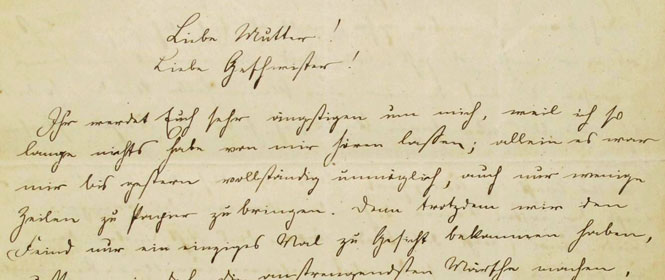
Baedeker: From Field Post Letters to Travel Guides
Summertime is travel time, and even those of us who don’t long to visit faraway places are on the lookout for insider tips for special things to do close to home. For a long time, the name ‘Baedeker’ was well-nigh synonymous with travellers’ guidebooks. The Baedeker style was above all shaped by Fritz Baedeker (1844−1925), one of the sons of the firm’s founder. His flair for precise observation and his accurate descriptions of foreign parts are already apparent in the letters he sent home from the battlefields of the Seven Weeks’ War (Austro-Prussian War) in 1866, as curator Thomas Jander states. The Deutsches Historisches Museum has recently been able to acquire thirteen of these letters.
The golden age of the Baedeker travel guides to foreign countries was the early twentieth century. Germans had developed an appetite for travelling, and the Baedeker guidebooks told them where to go, what to see and how to conduct themselves abroad. By 1913, the company’s annual sales figures had reached 250,000 copies, creating a turnover of nearly a million reichsmark.
Succinct, Factual, Clearly Presented – The Baedeker Style
Fritz Baedeker also presided over the development of the typical ‘Baedeker style’: matter-of-fact descriptions of near-telegraphic concision, brief notes, clear overall organisation of information and, above all, precise maps. This quasi-military style was in keeping with Wilhelmine society, in which uniform was worn as a sign of elevated social status, but it can also be traced back to Fritz Baedeker’s experiences of wars fought abroad.
We can catch a glimpse of these experiences thanks to the acquisition of a small series of thirteen letters written by Baedeker between May and October 1866 when he was a soldier in the Prussian army. What makes this series so special is not just the prominence of the author but also the integrality of the set, the circumstantiality of the descriptions and the remarkably good condition of the documents. No less important is its rarity. Currently only fourteen further letters are known to be preserved in other German collections.
Reports from the Front
Having transferred from the university of Heidelberg to that of Berlin, Fritz Baedeker served as a one-year volunteer in the mounted division of the Guard Field Artillery Regiment barracked on Friedrichstrasse at Oranienburger Tor. In April 1866, his unit set out for Bohemia. In July, Baedeker witnessed the Battle of Königgrätz (Hradec Králové) from the nearby village of Sadowa (Sadová). ‘I felt a great deal of pity for the many fallen Saxons who lost their lives far away from home for a cause that cannot have been dear to their heart […],’ the twenty-two-year-old wrote to his mother shortly after the battle.
Particularly vivid are his descriptions of the multi-ethnic population he encountered in the Bohemian market town of Dürnholz (Drnholec) in August and, even more so, his poignant account of the devastation wrought by an outbreak of cholera among locals and soldiers: ‘What is most gruesome is the sight of the corpses being carted away. People tend to wait until they have four or five bodies before they fetch a cart and place them on it, covering them with some straw. […] Then they are taken without further ado, and without any mourners following the cart, to the field where they are quietly and unceremoniously interred.’ Unlike contemporary newspapers, which attributed the cause of the epidemic to an overly fatty diet, Baedeker noted that the soldiers had not enough food to supplement their rations of meat and had therefore taken to digging up large quantities of unripe potatoes and eating them. Although he did not write in a telegraphic style, Baedeker already stuck to the essentials, summarising his impressions so as to convey a great deal of information in remarkably short texts.
After his military service, Fritz Baedeker returned to civilian life. He completed his training in the book trade in Geneva, and in 1869 he joined his brother as junior partner in the firm. In the Franco-Prussian War of 1870/71, he once again became a soldier and was made an officer in 1871. It was on these foundations that Fritz Baedeker drew when he took over the reins of the family business, and they not only informed the firm’s style but also the way in which the readers of his guidebooks perceived the world.